BBC pay: Claudia Winkleman, Zoe Ball and Vanessa Feltz among top earners
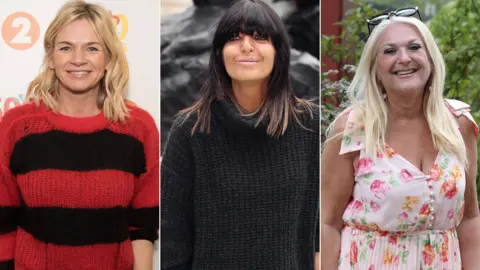 BBC/Getty/PA
BBC/Getty/PAClaudia Winkleman, Zoe Ball and Vanessa Feltz have all moved up the BBC's star salaries list after the corporation's efforts to tackle an equal pay problem.
The top 12 earners were all male last year, but Winkleman is now eighth, Ball is ninth and Feltz is joint 10th.
Match of the Day's Gary Lineker is still at the top of the list, on an unchanged £1.75m per year.
The total talent bill has risen by £11m to £159m, with the number of stars earning over £150,000 up from 64 to 75.
Of those 75 presenters and correspondents, 60% were men, down from 65% when the list was first published in 2017.
The stars' salaries are published as part of the BBC's Annual Report and covers the period from April 2018 to March 2019.
However, as usual the list is not a fair or complete reflection of what all celebrities at the BBC earn.
Actors and some entertainment presenters who work for the corporation's commercial arm BBC Studios are not included.
As a result, the stars of some of the BBC's biggest programmes - like Top Gear and Doctor Who - are absent from the list.
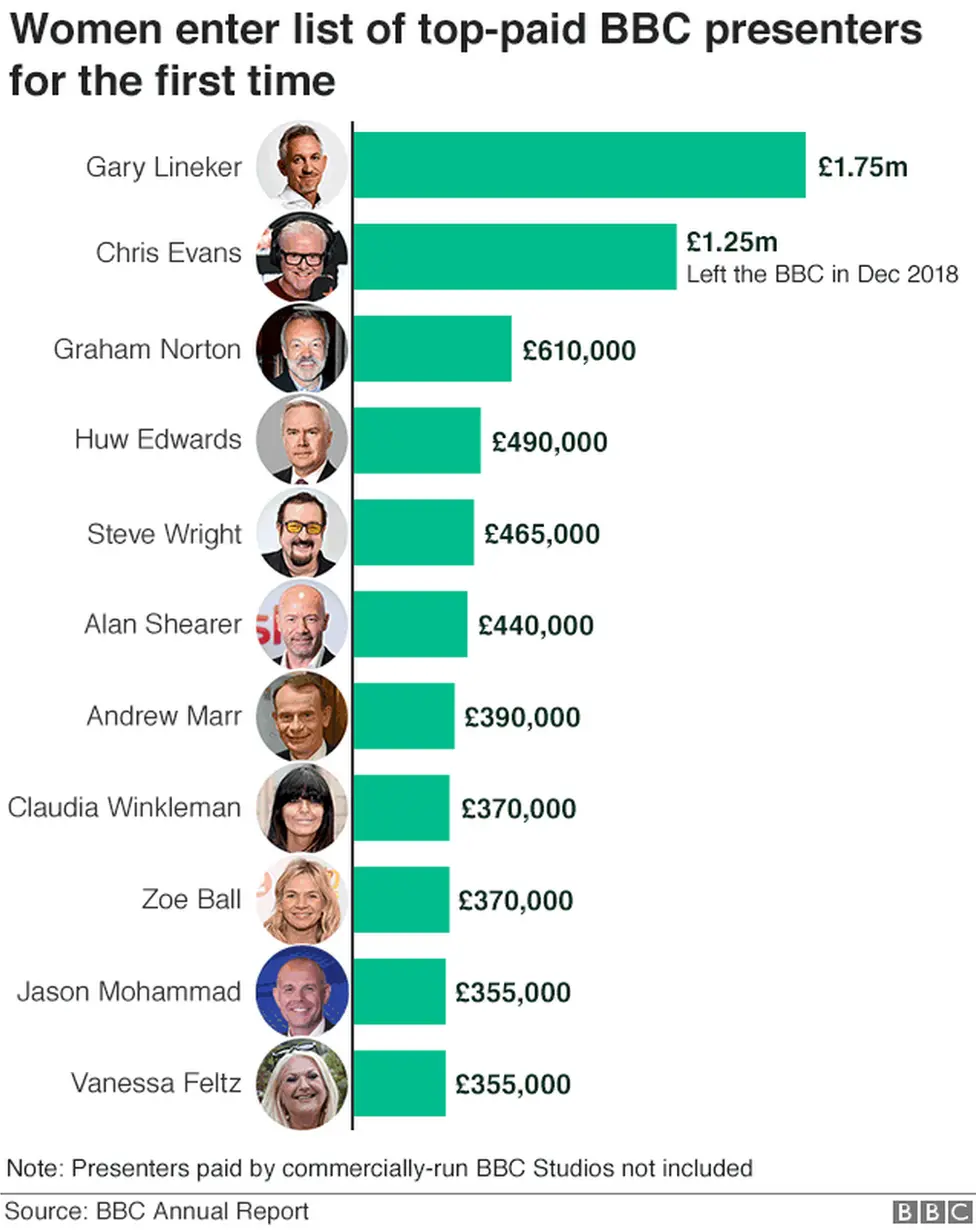

In the past 12 months, Chris Evans has left for Virgin Radio, replaced by Zoe Ball. As a result, his figure reflects nine months of work on the Radio 2 breakfast show before leaving in December, and not his full annual salary.
Similarly, Zoe Ball's figure only covers what she earned for hosting the breakfast show in the first three months of this year, plus her earnings for the Saturday-only Radio 2 show she hosted in the nine months prior to that.
BBC director general Tony Hall said the budget for paying talent was now a smaller proportion of total programming costs than last year.
Speaking about Lineker's pay, Lord Hall said the success of BBC Sport, which reaches 40% of the UK population, has "much to do with Gary", adding that he "does an excellent job".
BBC chairman Sir David Clementi said he had "seen no evidence we are paying anyone above the market rate", adding: "What I've seen suggests the opposite."
The figures show that some male stars including Jeremy Vine, John Humphrys and Steve Wright have taken significant pay cuts.
Vine earned around £290,000 in 2018/19 - down approximately £150,000 on the previous year. Humphrys is now on the same level, a cut of about £110,000.
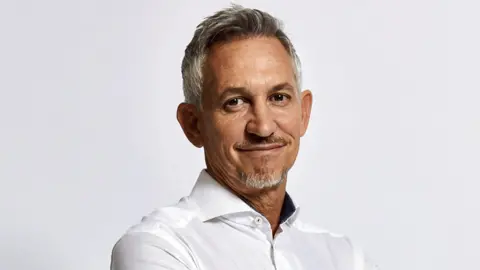
Wright has lost roughly £85,000; Stephen Nolan is down by around £75,000; and Nicky Campbell is reduced by approximately £70,000.
Nolan hosted a huge number of programmes for the BBC - around 350 editions in total including shows for Radio Ulster and 5 Live. Vanessa Feltz presented more than 400 editions of her shows across Radio 2 and BBC London.
Of the biggest risers, Zoe Ball and Sara Cox are both new entries on the list after landing the Radio 2 breakfast and drivetime shows respectively.
Other new entries include former footballer Jermaine Jenas on £210,000, BBC Breakfast's Louise Minchin on £205,000 and news presenter Clive Myrie on £200,000.
Of those who were also on the list last year, the biggest rises have gone to Jo Whiley (up approx £100,000), Jason Mohammad (up approx £95,000), Justin Webb (up approx £85,000) and Sarah Montague (up approx £80,000).
Lauren Laverne and Fiona Bruce both saw their salaries rise by roughly £75,000, while Sophie Raworth was up by around £60,000.
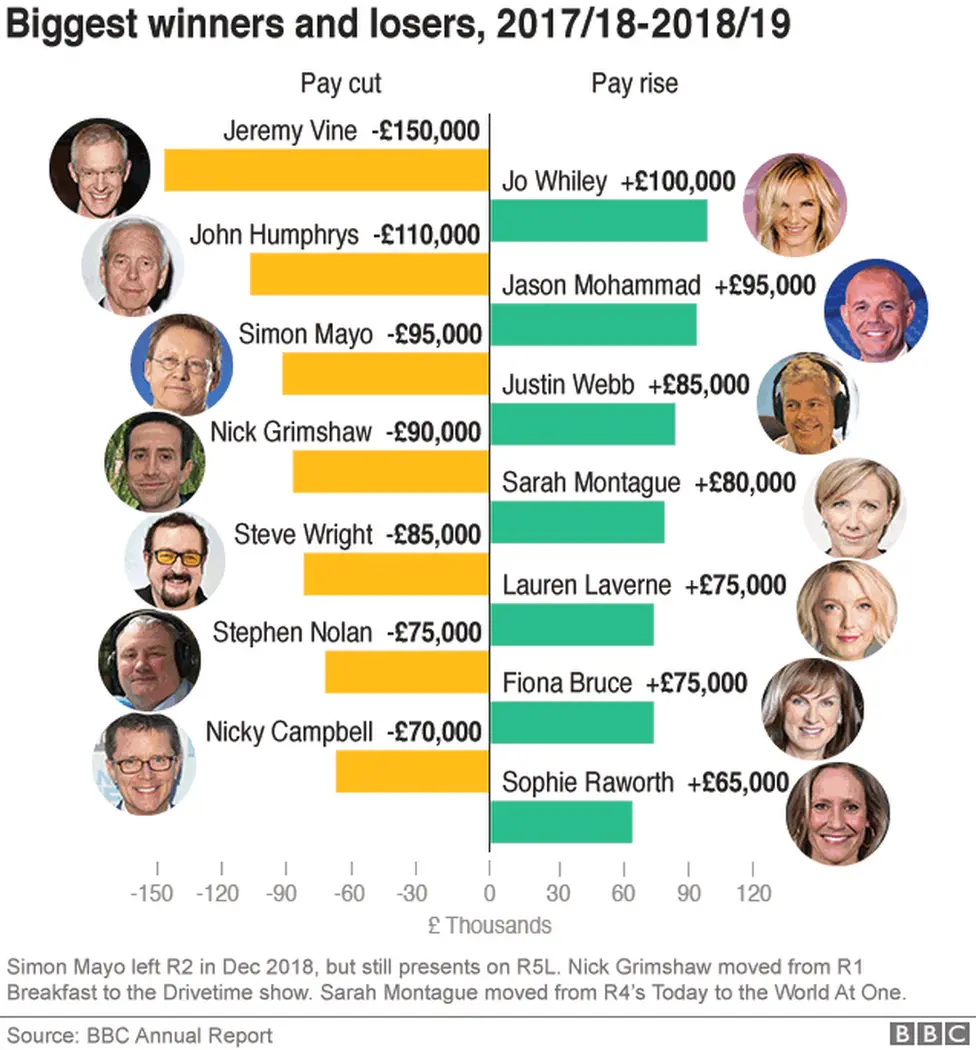

Three major figures have left for the commercial sector in the course of the year - Chris Evans, Simon Mayo and Eddie Mair.
The corporation's overall gender pay gap has fallen from 7.6% last year to 6.7% this time, BBC media editor Amol Rajan said.
Woman's Hour presenter Jane Garvey, who leads a campaign group called BBC Women, told BBC Radio 4's Today programme: "I'd like to congratulate the three women who have made it into the top 10.
"That's 30% of the top 10. Of course it would be nice if it was 50, or maybe even more than that. Who knows, we might reach that state of nirvana at some point in my life."
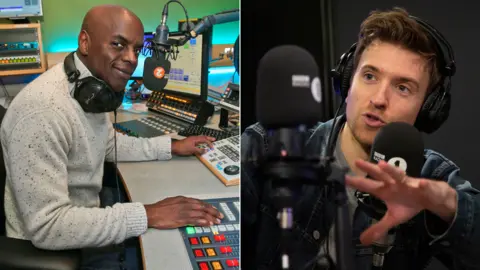
She said she had sympathy with the viewers and listeners who felt the salaries were still too high. "Perhaps it would have been better to cut more male salaries rather than to up some female salaries," she said.
In a statement, BBC Women said: "There has been some progress in the last two years, but many women at all levels of the BBC are locked into slow, inefficient and demoralising internal processes.
"New equal pay cases are still emerging and staff are yet to have confidence that pay inequality is in the past."
Lord Hall said the public supported the BBC to give high salaries to "big stars" because they were "talented and entertaining".
In an article for The Huffington Post, he wrote: "The BBC was rightly criticised for a lack of female representation when we first published details of our highest earning stars two years ago.
"But the reality is that on pay we have come a long way to becoming a fairer organisation since then."
Damian Collins, the chair of the Digital, Culture, Media and Sport select committee, said: "It is welcome to see more women named on the high earners' list. However, this masks the wider issue of equal pay across all levels of the BBC workforce.
"The rising talent bill is concerning in light of plans to remove free TV licences from all but the poorest of those over 75. We'll be raising this with BBC executives when they appear before the committee later this month."
The cost of providing free licence fees to over-75s is £745 million. This used to be paid for by the government, but in 2015 it was announced the BBC would absorb the cost by 2020 as part of a licence fee settlement.
Last month, the BBC announced that only low-income households where one person receives the pension credit benefit will continue to receive free TV licences. All other pensioners, around 3.7 million, will have to pay for a TV licence from June 2020.

Follow us on Facebook, on Twitter @BBCNewsEnts, or on Instagram at bbcnewsents. If you have a story suggestion email [email protected].
